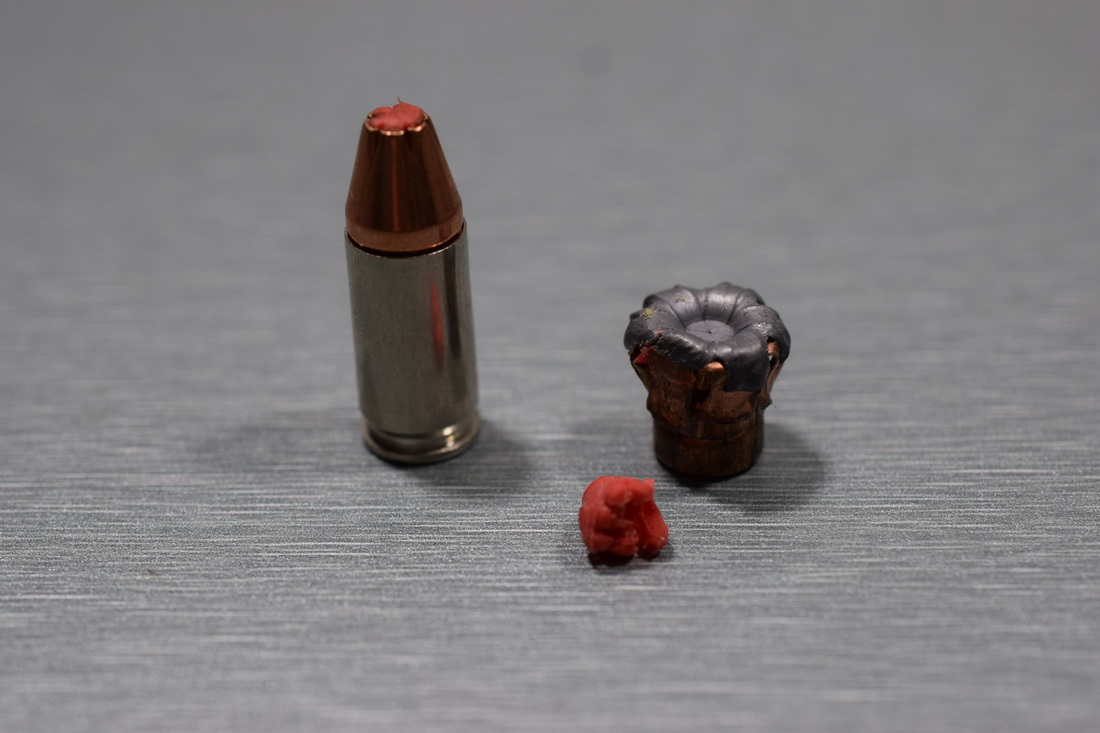When you are looking at the line of pistol calibers that you have to choose from, you may just be thinking that it would be nice to know what each one does well at, and where it has limitations. I am going to stick with the 3 main defense calibers just to keep it short and sweet. We will cover as much information as possible without dragging this on too long, so let's get started.
The 9mm Parabellum is the oldest and most popular pistol caliber on the market today. It is also still the only round on the market that offers the most efficient capacity/size ratio in your pistol. From its relatively inexpensive price point, to its growing effectiveness as a versatile self defense round, it is not hard to see why alot of people prefer the 9mm.
The 9mm in recent years has seen a considerable amount of advancement in terminal effectiveness. At this point, companies have done a good job making the 9mm defensive ammo reliable in terms of penetration and expansion. But where the 9mm does good directly against soft targets like people, it has a hard time reliably performing through barriers like metal and auto glass without going off course and changing trajectory slightly.
To be fair, the round in general is pretty light and is zipping along pretty fast, which may play a part in that. I have found that the 147 grain ammo performs better through barriers, and better overall as long as the barrel is at least 3.75" long. That is just my experience. My favorite round for the 9mm is the Hornady Critical Duty 135 grain +P. It has a record of penetrating deep and consistently, while also performing well through all FBI barriers. But then again, it was designed to meet and exceed the FBI standards.
As a round that is constantly bashed as being weak and a compromise, it actually sets a standard for what a pistol round should do when it hits its' target. The .40 has a reputation for having a good amount of kick to it, but with the reward of performing very well against human targets. The round also has earned a reputation for doing very well through barriers and still performing within tolerance in terminal effectiveness. This might be why the .40 S&W is so popular among police still. The slightly heavier weight of the round causes it to stay on course better than the 9mm after hitting barriers.
But one thing you will have to get used to, as i noted earlier, is the recoil. This can be quite a snappy round. Generally, I recommend practicing alot with this caliber. Followup shots are going to be the greatest challenge in your training. I just recommend that you be sure that the trade off is worth it to you.
I recommend sticking with a 175 grain Critical Duty for pistols with a 4" barrel or longer. For shorter barrels, I recommend the 165 grain Critical Defense.
Ah, the good old .45 ACP...my first love. This round is shrouded in legend and mystique for the overloaded claims of this round being the best round in the world. I have yet to see a round that has so many people behind it who claim it is a man stopping round. In my experience, and with what I have seen with my eyes, even rifle rounds are not going to stop a man. Man wants to live and man will do what it takes to live. Even if the heart is shot out, people can fight on for a little while with no sign of being hit. The .45 ACP does not pick people up and throw them and it does not make them disappear. So let us get these theories out of the way while we can.
What I will say about the .45 ACP is that it is a superb for barrier penetration. It can charge through windshield glass and steel like a champ without offsetting its trajectory at all. I like to use the .45 ACP as a vehicle gun mainly. As far at the terminal effectiveness, i will say that the big and slow round will do just as well as the previous two rounds, but will just make slightly bigger holes inside, which doesn't really mean too much in the long run, realistically.
This round is not as hard to control as the .40 S&W, but still will kick about a bit if you don't hold onto it. Practicing with this caliber can get expensive, but the learning curve is actually pretty short. The one big factor that you need to be aware of is the fact that this round is loud. I can shoot 9mm and .40 S&W all day without hearing protection and be good in a few hours, but the .45 ACP will leave you tone deaf for over a day if you overdo it. Each round will sting in your ear drum when you shoot it, from my experience.
This round isn't necessarily outdated and useless, but I do believe that we have come a long way in our ability to get the most out of our ammo. It has really narrowed down where the .45 ACP will actually hold an advantage. With a low round count in the magazine and generally fatter guns, this caliber can prove problematic for some people to fall in love with.
Author
David Donchess

 RSS Feed
RSS Feed